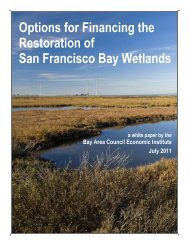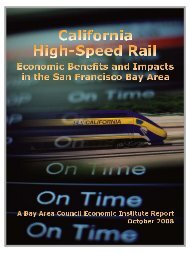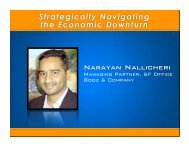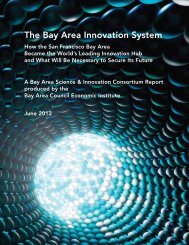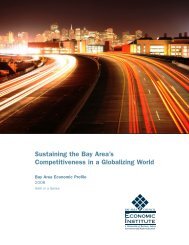Ties That Bind - Bay Area Council Economic Institute
Ties That Bind - Bay Area Council Economic Institute
Ties That Bind - Bay Area Council Economic Institute
You also want an ePaper? Increase the reach of your titles
YUMPU automatically turns print PDFs into web optimized ePapers that Google loves.
30<br />
<strong>Ties</strong> <strong>That</strong> <strong>Bind</strong><br />
Shanghai Jiaotong’s School of International and Public Affairs, and two joint research agreements—one<br />
on sustainable rural development and “new countryside building” with the Central<br />
Party School, a think tank and training center for government leaders, and another with the<br />
Shanghai <strong>Institute</strong> of American Studies on changing U.S.-China relations. The Center also publishes<br />
a weekly summary of China political and economic news.<br />
In February 2006, SFSU opened a branch of the Confucius <strong>Institute</strong>—one of four in the U.S.<br />
and 20 worldwide—in cooperation with China’s National Office for teaching Chinese as a Foreign<br />
Language. Three colleges on the SFSU campus—Education, Humanities and Extended<br />
Learning—will work with the <strong>Institute</strong> to develop Chinese language instruction programs for<br />
teachers, K-12 and college curricula for teaching Chinese as a second or heritage language, and<br />
offering courses and programs on Chinese language and culture for non-diploma students,<br />
among other activities.<br />
Alumni connections work both ways: Beijing University, Tsinghua University, Nanjing<br />
University, Shanghai Jiaotong University, Fudan University, National Taiwan University,<br />
Tunghai University, National Chiao-Tung University and others maintain active alumni<br />
association chapters in Northern California—combined membership for the latter two chapters<br />
is reportedly more than 2,500 alumni—to retain contacts with overseas graduates working in<br />
Silicon Valley.<br />
Trade Associations Spell Opportunity<br />
Alongside the university links is a parallel network of business and professional associations.<br />
They may be distinct to the PRC, Taiwan or Hong Kong; or to a profession, such as engineers,<br />
software designers or accountants. They may be purely social networking groups, promote trade<br />
and investment, facilitate cross-border networking and business incubation, or undertake policy<br />
research on U.S.-China relations and business issues affecting the Chinese-American community<br />
in the U.S. Some have links to government trade and investment promotion agencies. These<br />
groups serve as an informal infrastructure for trade, investment and business development.<br />
Government offices from China, Taiwan and Hong Kong provide official anchors for expanding<br />
economic ties. It should be remembered that, until 1979, mainland China was not recognized by<br />
the U.S. Hong Kong and Macau were territorial possessions of Great Britain and Portugal until<br />
1997 and 1999, respectively. Taiwan had diplomatic recognition as the government of China until<br />
1979, but recognition was withdrawn in favor of a more neutral “one China” position when<br />
relations with the PRC were normalized. Contacts with Taiwan have since been conducted on an<br />
unofficial basis, through counterpart non-governmental organizations. Today, the PRC conducts<br />
official trade and investment promotion through its consulates. The Chinese Consulate-<br />
General (PRC) is located in San Francisco, and has actively worked through the local Consular<br />
Corps and with government agencies and non-profit business groups in hosting delegations and<br />
programs, and showcasing Chinese manufacturers, science and industrial parks and cities offering<br />
investment incentives.



